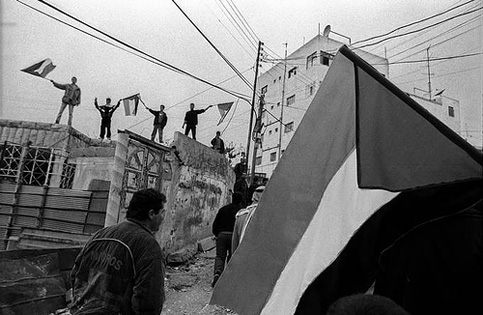Commemorate the Victims of the Sabra / Chatila Massacres.
Statement Prepared by the Coalition Against Israeli Apartheid & Tadamon! Montreal.

MONTREAL: This week is the 25th anniversary of the massacres at the Sabra & Chatila Palestinian refugee camps in Lebanon. Today we commemorate the lives of those who were murdered or ‘disappeared’, as well as the thousands of others who died in Israel’s 1982 invasion of Lebanon and the Lebanese civil war.
On 6th June 1982, under the direction of the then Minister of Defence Ariel Sharon, the Israeli Defence Forces (IDF) invaded Lebanon. Its declared goals were to destroy the Palestinian Liberation Organisation (PLO), support its Christian allies in the ongoing Lebanese civil war, and to avenge the recent attempted murder of its British Ambassador. (The group responsible for the assassination attempt were in fact the Abu Nidal Organisation, enemies of the PLO.)
Towards the end of the summer of ’82, much of the south of Lebanon was now in ruins and thousands of Lebanese & Palestinian people were imprisoned. Israel’s brutal siege of Beirut had forced the PLO to evacuate the remains of its forces from Lebanon on September 1st, after negotiating that the security of the Palestinian civilian refugees would be guaranteed by the Americans. In breach of its cease-fire agreement, Israel then continued its invasion into West Beirut, with the justification that it was protecting the civilian population from the possible revenge of the Christian forces.
Part of this ‘defence of civilians’ was to secure the perimeters of what remained of the Sabra & Chatila camps. The Americans, French and Italian peacekeeping forces, whose job was to provide refugee security, had left only a few days before. The IDF then ordered a small force of soldiers to enter the camps, to carry out what they called a ‘mopping up’ operation. This group was drawn from the Christian Phalange Force and the self declared South Lebanon Army (SLA). The fascist Phalange forces were exactly those forces that Israel, only days before, had claimed were likely to avenge themselves by killing Palestinian civilians. The SLA, the militia of former Lebanese Army General Saad Haddad, were significantly a creation of the IDF to help it police the south of Lebanon. They were directly under IDF command.
The soldiers selected for the ‘mopping up’ operation were drawn from brigades that had been directly involved in earlier massacres of Palestinian civilians. This party of about 150 entered the camps on 16th September 1982. The IDF provided flares to keep the camps lit at night. After two days of atrocities: raping, killing women, children, the elderly, they left the camp. By the end of the operation as many as 2000 unarmed refugees had been killed. The exact number of dead was hard to ascertain because so many had already been killed by shelling under the Israeli siege. Also, before outsiders could gain access to the camps, many of the bodies had been removed, some piled in the scoops of bulldozers.
Despite the huge outcry the massacres elicited from around the world, no one ever faced trial for the crimes. Elie Hobeika, the Phalange leader most consistently accused of responsibility for the massacre, continued to play a significant role in Lebanese politics until he was assassinated in 2002.
Saad Haddad, maintained his command of the SLA until his death and Ariel Sharon, the senior Israeli most responsible for the massacre became Prime Minister of Israel in March 2001. By the time Israel had withdrawn to the southern borders of Lebanon in 1983, the IDF had killed as many as 20,000 Lebanese & Palestinians, most of them civilians.
Tragically, the plight of the Palestinians remains dire. They are still refugees in Lebanon, without basic social and political rights. The recent events of Nahr el Bared and the consequent humanitarian tragedy for civilian refugees show that the camp residents are still the most vulnerable population, victims of political fighting. Palestinians still live under an Apartheid regime in Israel and the Occupied Territories.
Israel has and continues to commit war crimes in Lebanon and Palestine, with the goal of eliminating all resistance to its campaigns of colonization and occupation, and the world remains silent. The Sabra and Chatila massacre in 1982 and the summer 2006 war on Lebanon are both examples of how Israel is able to carry out mass murder with impunity.
In order to pressure Israel to end its crimes, support
the International Boycott, Divestment & Sanctions (BDS) campaign!
Boycott Indigo/Chapters! Boycott Israeli Apartheid!
* For more Information on the Boycott, Divestment & Sanctions campaign visit:
the Coalition Against Israeli Apartheid
the Coalition for Justice & Peace in Palestine
* Tadamon!’s Boycott Resource Page.


